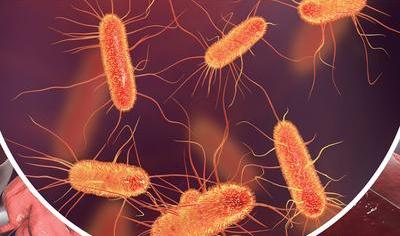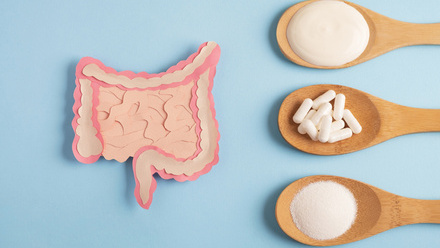
We usually think of bacteria as something harmful and nasty and, as a result, diligently wash our hands after toilet visits and spray our work surfaces with antibacterial cleaners. Bacteria have a bad name for good reason as they can be the cause of serious diseases such as pneumonia and food poisoning.
However, not all bacteria are ‘bad’ and we live in a close relationship with a whole host of ‘good/friendly’ bacteria that are on us, and inside us - and in fact are essential if we are to stay in good health.
Exploring the Gut Bacteria
Many of us will feel slightly queasy at the thought that the human body contains at least as many bacteria as actual human cells! Some live on the surface of your skin, inside the mouth or the nose – but the biggest numbers are living inside your gut, particularly in the lower end of the digestive tract (called the colon or bowel). This community of bacteria is called the gut flora or microbiota.
We know that there are around 1,000 different bacteria that can live inside the human gut, but each one of us typically has only around 100-150 at any point in time. What is fascinating is that we all have a completely unique gut flora, and as there are so many different possible combinations of bacteria, it appears that no single combination will be the ‘optimal healthy gut flora’ – what is perfect for me will not be perfect for you. What seems to matter most is eating a wide range of healthy fibre-rich foods in your diet to support a wide range of friendly gut bacteria.
What do gut bacteria do?
The gut bacteria do lots of great things for us – here are just a few…
- Digesting – they help our bodies to digest food and absorb nutrients. In particular, bacteria are experts at breaking down dietary fibre (parts of cereals fruit and vegetables that we cannot digest).
- Vitamin Boosting – bacteria also produce several vitamins which we absorb and use, including folate, riboflavin (B2), niacin (B3), B12 and vitamin K (which helps with blood clotting).
- Protecting – friendly bacteria help to protect us against their dangerous relatives that cause disease by crowding them out in the gut.
- Producing – as they break down dietary fibre, the gut bacteria produce short chain fatty acids (SCFA’s) – key ones being butyrate, acetate and propionate, each of which is used differently by the body. Butyrate is used by the cells lining the colon and helps to reduce inflammation and protect against colon disorders. Acetate is absorbed and used by the brain, muscle and body tissues, and propionate goes to the liver and may help to lower cholesterol and blood sugar levels.
- Immune Enhancing –helping to boost our immune system by killing harmful (pathogenic) bacteria; stimulating infection-fighting cells in the blood stream; and by providing an extra barrier between the waste products from eating and drinking and our blood stream, reducing the amount of harmful substances ‘leaking’ into the blood stream.
Can my gut flora really help to keep me healthy?
The simplest answer is ‘yes’ – look after your gut bacteria and you are looking after your long-term health. Over the past 10 years there has been a huge amount of discovery of the amazing roles that we now believe gut bacteria play in our health and wellbeing.
As technology advances, we will discover more and more about different bacteria and how they help us. In fact, the gut flora is now being called the ‘forgotten organ’ and appears to influence a wide range of conditions including obesity, diabetes, heart disease, irritable bowel syndrome and colorectal cancer. Interest is also growing into how the gut flora interacts with the brain function (called the gut-brain axis), and how this can affect mood and conditions such as Alzheimer’s and depression.
We don’t yet have the answers as to whether shifts in the gut flora cause disease or if this happens as a consequence, but research suggests that a diverse and stable gut flora can help to alleviate some of the symptoms and challenges these conditions bring.
How do I look after my gut flora?
One of the most important ways to look after your gut bacteria is to eat a healthy balanced diet containing a wide variety of different foods rich in fibre.
Balance is key as high intakes of any particular nutrient such as protein, fat or even vitamins and minerals can all alter (increasing or lowering) growth of different bacteria types. This said, other things in life also affect the health of your gut flora, including antibiotics (which can reduce gut flora numbers) and medications such as laxatives, exercise (becoming more active appears to improve gut flora) and alcohol consumption. Some may be unavoidable, such as needing a course of antibiotics, but increasing exercise and moderating alcohol intake are within your control.
Many studies have shown that changes to diet can result in rapid changes to the gut flora, so the good news is that you can quickly make a difference. Probiotic drinks and yoghurts (which contain live bacteria) provide a boost to the specific strains of bacteria that they contain, but only while you continue to take them. The route to developing the diverse gut flora important to great health, appears to be eating a variety of foods that are rich in fibre on a daily basis – ideally topping up the food supply to your bacteria several times a day.
There are lots of different types of fibre in our diets, often referred to as soluble (such as that in oats or beans) or insoluble (such as wheat bran). Improving the amount of fibre, and range of foods consumed, is likely to promote gut bacterial diversity could help to maintain health today and improve health in the future.
On average, we in the UK are all eating far too few fibre-rich foods, with intakes of fibre hovering around 20g a day, way below the 30g a day recommended for good health. A recent review of evidence found that increasing intake of wheat fibre/wheat bran by as little as 6g a day (the amount found in a bowl of high fibre breakfast cereal or 2 thick slices of wholemeal bread) was enough to have an effect on the gut bacteria. Something that all of us in the UK could easily achieve. And it's not just cereal fibre that can help – trying to eat several different fibre containing foods over a day is important – including fruits, vegetables and cereal foods.
I recently read an article which concluded with the line ‘We never really eat for just one – our trillions of little friends get fed with every bite’. So, by choosing a balanced and nutritious diet with a good dose of fibre you are helping to keep everyone happy!







